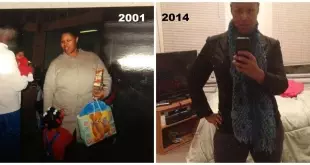This is inspired by a piece done recently on The Today Show: 6 Things You Never Say to Someone Who Has Lost Weight. Those things apply but I feel like there’s things people say to us after our surgeries that are just wrong (and some are potentially harmful) so here goes.
“Yeah, I’m losing weight the hard way.”
Ok so I should start off telling you that here at Bariatric Foodie we call folks who haven’t had weight loss surgery “non-ops.” And I got some push-back on that. Listen. It’s not a derogatory term. It’s simply a term to distinguish someone who has had WLS from someone who has not. Having said that…
You. Non-op. Come closer so we can speak.
Imagine waking up tomorrow and your stomach was a fraction of the size it was before. Imagine taking your first bite of food in the morning and that bite of food makes you violently ill – and you don’t quite know why. Imagine everything you eat makes you violently ill. Imagine going out to eat with friends and being done your whole meal before your friends have taken three bites of an appetizer. Imagine having the whole world see you shrink into a person you don’t know and have never been before, all while you are supposed to be joyful (instead of freaking out, which is what you really are). Imagine having to remember to take vitamins every day. Imagine having doing the same workout you are doing “the hard way” except your body has only a fraction of the calories to sustain it. Imaging going through all that and having someone imply that you are doing things the “easy” way.
No matter what way you do it, losing weight is hard. So don’t say that anymore.
“My sister’s cousin’s boyfriend’s ex-girlfriend’s sister had weight loss surgery and they gained all their weight back.”
Firstly, no they didn’t. That person is an urban legend. While folks who have weight loss surgery can regain, you probably don’t know that person.
Beyond that, if you believe in the power of positive thinking, this statement can be really destructive. It spawns fear, self-doubt, self-consciousness. Weight loss surgery patients live in a constant tension between adhering to many guidelines and trying to live a normal life. Many of us are already so petrified of regain that, for all intents and purposes, we’ve actually worked in earnest to develop eating disorders.
A better thing to say is “I wish you all the best” and leave it at that.
“You’ve lost too much! You need to stop.”
On this one, I have a bit of sympathy. Chances are your friend or family member was overweight or obese for a while before having surgery. And there’s a good chance you only ever knew them that way. They are going through big changes. They are shrinking fast.
Rest assured your loved one is being monitored by an expert medical team. They have a bariatric surgeon, a registered dietician and other staff who monitor their weight very closely for the first two years after surgery. Very often their weight and health is monitored pretty closely even after that.
Each person has a different way to determine their goal weight. Unfortunately, it’s not up to you to decide what that weight is. Telling someone they’ve lost too much is just as bad as telling them they have gained too much weight. It promotes low self-esteem and self-consciousness.
A simple “Wow, you’ve lost a lot of weight!” is both honest and much more respectful.
And lastly my personal favorite…
“You’ve changed since you had surgery.”
My initial response the first time someone said this to me was “Well…yeah. Isn’t that the point?”
My grandmother had a wonderful saying. “If nothing changes, nothing changes.” Obesity is not just a disease of eating. Our environments, emotions and stressors can all contribute to our obesity. The only way to sustainably address obesity is to work at all of its causes in our lives.
That said, if your loved one suddenly is less tolerant of demands on their time, or they take longer to get ready to go out the door because they want to look nice, or they like to go clothes shopping, YES they have changed. No, that’s not necessarily a bad thing.
On the same token some of us go through a serious “butthole phase” where we are a bit self-centered and hard to deal with (present company included). In those cases, address the behavior in particular. For example, if you find your loved one talks nonstop about their post-op life, you might say: “Hey, I know you’ve got lots going on, what else is happening in your life?” We go through stages after surgery and we are human. If we are being inconsiderate it may be a stage and we may not be aware we are doing it. But implying that it’s bad we are changing isn’t helpful or constructive.
If we’re doing something that bugs you, talk to us respectfully about the thing we are doing instead of generalizing. Bonus: you actually have a chance of working it out when you do it this way!
 Bariatric Foodie Play with your food
Bariatric Foodie Play with your food




Let's not forget "Are you sure you should be eating that?"
Just….UGH!
I have reached a point where I now ask the asker, "Why, you look like you have gained weight… How much have you gained?"
That generally will stop them dead in their tracks…
Lol. That's great.
Or it's the cheating lazy way…
Sadly I DO have a friend who had the surgery and it did NOT work…I feel bad for her because she still cannot eat a lot and will get very sick if she over eats….
First off, I have utmost respect for those who choose to undergo bariatric surgery. To make the decision to permanently change the rest of your life in order to increase your health is one that takes courage and determination. In all honesty it really is the "ultimate commitment" to weight loss. Having said that, As a "non-op" I find it really irritating when someone who has had successful bariatric surgery starts to lecture their larger friends who are still struggling with their weight about what to eat. I had a person I worked with once tell me, "If you would just watch what you eat and maybe exercise a little more, you'd see some results." It was very difficult to not retort with, "Well if I had stapled 3/4 of my stomach off it wouldn't be that difficult to watch what I ate, now would I?" Obviously that comment would have been inappropriate, and so I simply smiled and moved on. The point is, once you have been successful, no matter what route you took to achieve your goal, it is easy to start lecturing and becoming condescending. Try to remember the struggle before the surgery and recognize that it isn't the right route for everyone. Many of the things you've listed aren't just things that you shouldn't say to someone who has had bariatric surgery, but things you shouldn't say to people at all, unless you're a giant douche. Congratulations to all of the "ops?" out there who have taken such a giant leap to ensure their health, and best of luck on your continuing weight loss journeys! 🙂
I think anyone who tries to change their life to be healthier is awesome. Period! This post really just was an addendum to the article about things people who lose weight are told (linked). I think WLSers get some of the same comments but there are a few we in particular hear a lot that I wanted to speak l. Thanks for weighing in!
One that I disagree with is the part about losing too much. Sometimes, post-ops DO lose to much. My mother and I both had Roux-En-Y. I lost over 200 pounds, then gained after having two children, back to back. I still am working on my own weight loss… 6+ years after having my last child. My mother, however, started at over 260 pounds and lost WAY too much. She weighed UNDER 100 pounds by the time she was 2 years out. She followed the doctor's directions on eating, vitamins, etc. So, I'm sorry, but I disagree with NOT telling someone if he or she has lost too much. Some DO lose too much, even when they are under close supervision from the surgeon and/or primary physician. My mother was skin and bones. She was physically weak. She fell, multiple times. She had to have surgery… then developed an infection that her body couldn't fight. Just over 2 years after her surgery, she died. If I could go back, would I still support her decision to have WLS? Yes. However, I would suggest a different surgeon, for sure. But you better believe that THIS post-op will most definitely tell someone if he or she has lost too much. Even under close supervision, there IS such a thing as losing too much!
On behalf of the folks I've spoken to, I disagree. I have many Foodies who did in fact loss too much and most reported that being told that wasn't very helpful. For what it's worth I don't think folks should really make comments in either direction (too big or too small). Most times people know already and being told constantly usually doesn't do anything constructive.
I quite like it when people mind their own damned business about my shape and size, like I mind my own about theirs. So, keeping schtum and talking about more interesting things than one's weight, on either side of a conversation, is my preferred way to roll!
For anyone who thinks that it’s the EASY way. WRONG. I had it in 2005 and nearly died. For 3 years I fought to live. I even has to have a feeding tube for liquid food AND water. Even though I lost 100 lbs. I’d never do it again. Anyone who knows me, knows it was not EASY!!!!! You can never eat ‘normal’ again. But, you still have to fight cravings.
My sister had this surgery and it worked for a while, but she should never have had this done. She’s not mentally stable enough (bipolar). She expected the weight to fall off and her skin to shrink back to her teenage years. She never ate healthy that I witnessed. She kept the weight off for a year and is now back where she was. Also, with her fluctuating weight, her bipolar medication had to be constantly adjusted or the personality highs and lows were dangerous to her. To this day, I don’t know what quack did this surgery, her history should have eliminated her from consideration.
There are many successful and many unsuccessful weight loss surgery outcomes. My Dr, dietician, friends kept pushing ‘surgery’..
I did as much research as I could, dug into the science, biology and pshyc reasons for my weight. Found the answer…it took a little trial and error but after 6 months I’ve gone from 306 to 220. 86 pounds lost in six months by changing my mindset.
For myself, I know I’d never feel comfortable with having wls, in my own mind, I knew, even if I lost all the weight I’d not have done it under my own steam and I’d have felt like I cheated myself.
Hi Linda,
Thanks for your comment!
If I’m being honest, I have to admit I struggled with how to resond to the last paragraph of what you said.
Let me tell you what I’m reacting to first of all. You said “I’d not have done it under my own steam and I’d have felt like I cheated myself.”
So here are my reactions.
I can’t speak for how you’ve seen weight loss surgery carried out, but I can assure you I personally lost every pound under my own steam! I go to the gym several times a week. I make healthy food choices. I drink water. I manage my stress. I get adequate sleep. Those are all the things you would have to do in order to lose weight. I put in the same amount of effort (if not more!) than friends I know who have tried to lose weight. However, knowing that I have compulsive eating issues, I also chose to use a tool that would help me learn to stop overeating and start developing a healthy mindset toward food.
If that isn’t doing it “by my own steam” I’m not sure what is!
Secondly…on cheating yourself. In what other realm of society is it more favorable to do things the hardest way possible? I will concede that while weight loss surgery is NOT “the easy way out” (by any stretch of the imagination) it does make it easIER to lose weight consistently when you do everything else you are supposed to do. And that’s ok. Just to put that in perspective, do you come home every night and build a fire (by rubbing sticks together) and mount your food over it to cook it? NO! You use an oven/stove (or at least I hope you do). The stove is a tool. Your meal was no less cooked by you because you used that tool and while the stove made it easier for you to cook the food, that does not mean you put zero effort into cooking the food.
I do appreciate the fact that you point out that there are many ways to lose weight. Weight loss sugery is simply one option among many, but it’s a VALID option. In choosing it people are not “cheating” (themselves or anyone else), they are not doing less work, they are not lazy, they are not looking for quick results.” They are using a highly effective tool to increase their chances of putting the disease of obesity into remission.
If you don’t feel that weight loss surgery is right for you, that’s a 100% valid thought and I respect that. But please, please, please take some time to learn about the process so that you don’t inadvertently shame someone into not getting surgery for whom it could be a life-saving intervention. Do no harm, Linda.